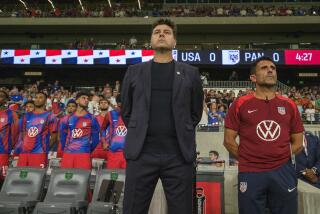Politics Stands in the Way of an Improved Gold Cup
- Share via
EAST RUTHERFORD, N.J. — The problem with being a first-rate soccer power in a third-rate soccer confederation is that whatever triumphs are achieved can never be truly enjoyed.
So it was on Sunday when the United States defeated Panama on penalty kicks at Giants Stadium to win the CONCACAF Gold Cup for the third time.
Once Mexico was unexpectedly knocked out of the tournament in the quarterfinals, the fizz went out of the whole event. The 12-nation championship had been built around a U.S.-Mexico final, the North and Central American and Caribbean (CONCACAF) region’s two heavyweights.
Without Mexico, it became a ho-hum, who cares affair.
No offense to the CONCACAF’s 36 other member nations, but that’s a fact. The U.S. and Mexico have won seven of the eight Gold Cups contested since the first in 1991.
Occasionally, another country puts up a good fight, as Panama did Sunday, but only Canada’s surprise victory in 2000 has broken the pattern.
And it was not as if Mexico was ousted by a team from this region. It lost to Colombia, which, along with South Africa, was an invited guest in the tournament. That the Gold Cup needs such “guests” underlines its basic flaws.
Things would be far more interesting if FIFA showed some initiative and forced CONCACAF and CONMEBOL, the South American confederation, to combine into a single, 48-nation confederation.
The Gold Cup could then disappear and the Copa America could become the regional championship -- an honest-to-goodness Cup of the Americas.
With the likes of Argentina, Brazil, Colombia, Costa Rica, Mexico and the U.S. competing, it could, in time, rival the European Championship in appeal. Or, if that’s an exaggeration, at least it would be a lot better than what is being offered.
As it stands, CONCACAF’s 2005 showcase was merely a blip on soccer’s global radar, a pale and largely amateur imitation of last summer’s wildly successful Euro 2004 in Portugal and of the equally entertaining Copa America in Peru.
Even CONMEBOL acknowledges its own weakness by inviting foreign teams to play in the Copa America. Costa Rica and Mexico took part in 2004.
Combining the Americas into one confederation could also boost the potential for a club championship along the lines of the enormously successful and lucrative European Champions League.
The Galaxy against Boca Juniors with something on the line would be a lot better than the Galaxy against Real Madrid just for fun.
The logic of such a move is undeniable.
What stands in the way is politics. Those who have built small fiefdoms in soccer’s backwaters, especially in the Caribbean, will be reluctant to give them up, even for the greater good.
Self-interest, as usual, will prevail, and more is the pity.
*
American players who helped themselves during the Gold Cup were defenders Oguchi Onyewu and Jimmy Conrad and midfielders John O’Brien and Chris Armas.
The World Cup 2006 hopes of all four have been enhanced, even Conrad, who came in as a complete unknown on the national team level.
Those whose hopes took a downturn were forward Conor Casey, because injury ruined his chance to show, and defender Tony Sanneh, who appears to have passed his sell-by date.
For others, including Greg Vanney, Clint Dempsey, Pat Noonan and Brad Davis, the jury is still out.
Next up for the U.S. are World Cup qualifying matches against Trinidad and Tobago on Aug. 17 and Mexico on Sept. 3.
Who gets called into camp for those games will reveal more of Coach Bruce Arena’s thinking.
*
One of the more farcical things to happen during the Gold Cup was the elevation of the U.S. to No. 6 in the FIFA world rankings.
There is not a lucid soul on the planet -- U.S. coaches and players included -- who believes that there are only five national teams better than the U.S. Any such assertion is ludicrous.
The rankings are based on a mathematical formula that takes into account such things as a team’s results over a period of years, the significance of the competitions in which it plays, the relative strength of its opponents and, for all anyone knows, the phases of the moon and the mood of FIFA President Joseph “Sepp” Blatter.
It is a complex formula, one that would give pause to a Caltech graduate, let alone the fan in the stands.
Suffice to say that the rankings in no way reflect reality. The formula is flawed.
The U.S. came into the tournament ranked No. 10, which is what American goalkeeper Kasey Keller was referring to during some postgame comments in Seattle after a Gold Cup match a couple of weeks ago.
“The mindset now is that we feel that we can win every time we step on the field,” Keller said. “In the past it was always, ‘Well, maybe we can do this. Maybe, you know, let’s see what happens.’
“We’re not sneaking up on anybody anymore, and teams are fully respecting us.
“We want to be able to live up to that [No. 10 ranking]. We want to be able to take it to that next level, where we compete against the English and the Dutch and the Germans.
“We’re very strong basically from 10 backwards. Now we have to start really making that push into the teams that are ranked in the top 10.”
For the record, the U.S. is 2-6 all-time against England, 0-3 against the Netherlands and 2-5 against Germany -- yet all three are ranked below the U.S.
Rising to No. 6 was simply a matter of riding all the hot air emanating from FIFA headquarters in Zurich, Switzerland.






